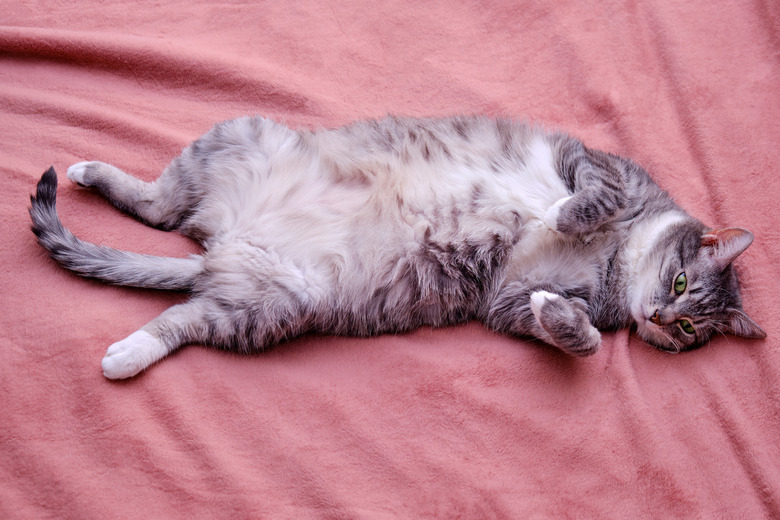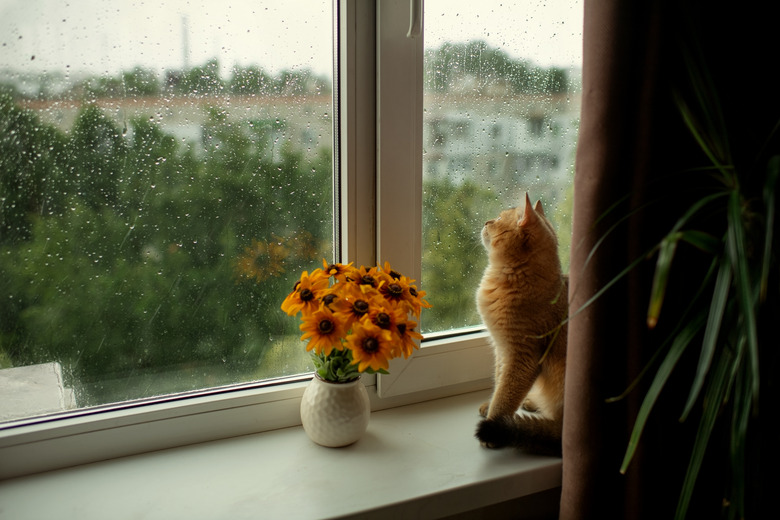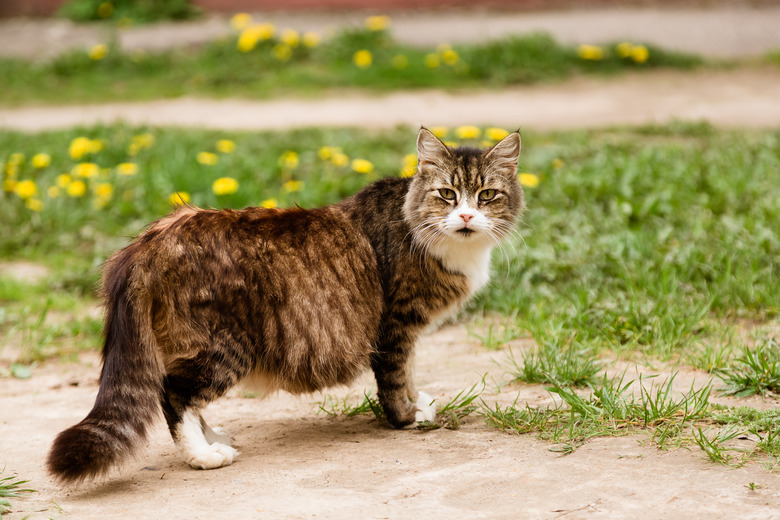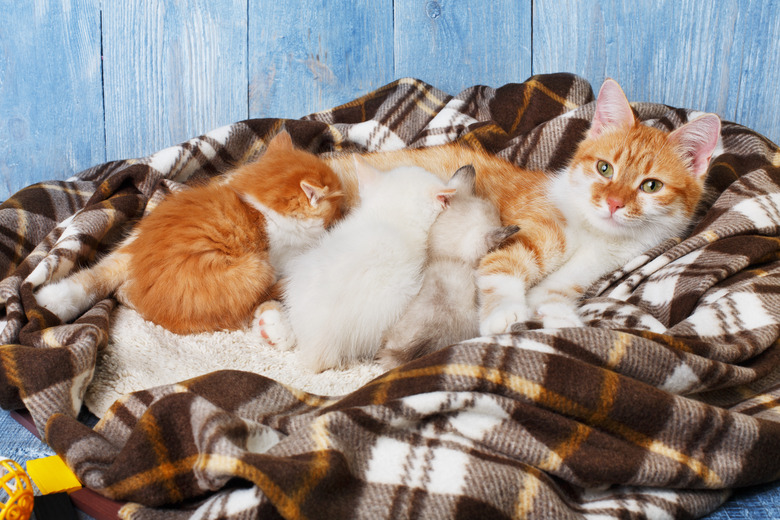Homeopathic Remedies For Cats In Heat
Cats usually go into heat for about seven days, but it can last for as long as two weeks. If your cat is showing behavioral changes, like rubbing against objects, furniture, or walls; loudly vocalizing; and raising her hind end, she is probably in heat. There is no actual "treatment" or "remedy" for a cat in heat because the only real treatment for a heat cycle is to spay the cat to prevent another one.
Since cats seem uncomfortable during this time, you may want to provide your pet with some natural soothers. Current veterinary medicine recommendations are to spay female cats by 5 months of age before her first heat cycle. Spaying your cat is the best option for ending her distress, but other remedies may help keep her calm.
Should I keep my cat indoors?
Should I keep my cat indoors?
Yes, cat parents should keep their unspayed female cats indoors during heat cycles. Surviving a cat's heat cycle is about management to avoid any litters and keeping her comfortable. If she is normally an outdoor cat, you must keep her inside while she is in heat. This will help prevent adding to the overpopulation with unplanned litters and will save you and your cat the stress of pregnancy. In general, an indoor cat is safe from predators, tomcats, and harming the native bird population.
Keep your unspayed cat away from male cats
Keep your unspayed cat away from male cats
If you own multiple cats and some of them are tomcats, it is imperative that you keep them away from your female while she is in heat. You can set up each of them in different rooms of the house so they each have their own areas complete with interactive toys, climbing equipment, a cat food station, and a litter box. The tools discussed below can also be used to help any male cats calm down and remain stress-free during your cat's heat cycle.
Natural calming remedies for your female cat
Natural calming remedies for your female cat
Rescue Remedy for pets is a blend of five flower essences that has been used since the 1930s. It is a glycerin-based, alcohol-free formula that is safe to use for cats. Many pet owners say that it can be used as a supplement for cats in heat to possibly ease your feline's stress. If your cat seems tense or stressed during her estrus, it's possible that Rescue Remedy might make her feel calmer without causing sedation.
This supplement comes in a liquid that you can add to a few treats or her food. You can also place a few drops in her water so she can get the supplement that way. Some people also use Feliway to help keep cats calm. Just like some cats do not react to catnip, some cats may not react to natural remedies.
Use a synthetic cat pheromone
Use a synthetic cat pheromone
Some of the best products for cats in heat are synthetic feline pheromone products. Synthetic cat pheromone products, like Feliway, emit an odor that has a calming effect on cats, including those in heat. If you have multiple cats in the home, it may have a calming effect on all of them.
You can spray synthetic cat pheromone products around your home or buy them in diffuser form to plug in around your home. The pheromone scent also helps discourage any urine spraying when your cat is in heat.
Distract your cat with play and attention
Distract your cat with play and attention
Female cats love caterwauling during their heat cycles. Distract your cat by providing her with new toys and playing with her as much as possible. Give her plenty of puzzle toys to play with so she'll be distracted from the discomfort of being in heat. You can also offer her toys filled with catnip if she enjoys catnip and it doesn't cause overexcitement.
Interacting with your cat is quite calming for her because cats find social interactions with their owners very soothing. Use toys on a string to interact with your cat, which will tire her and reduce her stress while she spends time with you. Extra attention of any kind can help take her mind off her distress, so pet her, cuddle with her, brush her, and spend extra time with her.
If you notice that your cat in heat is meowing, yowling, or caterwauling and trying to escape outside, it's a good time to distract her with a play session.
Enrich your cat's environment
Enrich your cat's environment
Give your cat plenty of spaces to hide, like a cat condo, cat tree, bookshelf, heating pad to lay on, or box to sit in. One of the best natural calming remedies for cats is simply providing them with small spaces where they can feel safe. Think of them as little feline getaways.
In addition to cat condos, add some cat-specific wall shelves for your cat to climb on during her heat cycle. This way, when she's feeling stressed, she can have a safe spot away from people and other pets where she can calm down and spend time alone.
Play calming cat music
Play calming cat music
Play music, particularly music specifically composed to calm cats. Cats can be soothed by music, and studies have shown that it can make them feel calmer during stressful situations. While this type of cat music is readily available online, you can also play classical music as well.
Set the music to play while you're not at home so that your cat in heat will continue to benefit from the calming effects. You can also play it in the background when you're together.
The bottom line
The bottom line
The only true treatment and the best course of action for a cat in heat is to prevent a heat cycle by spaying her before 5 months old or as soon as the veterinarian recommends following a heat cycle. There are management tools that you can try to help keep her calm and stress-free during her heat. Using pheromones and calming music can help ease her stress level. Giving her access to interactive toys and extra time with you can help keep her mind busy and off her discomfort. The most important things are to keep her indoors and away from any male cats to ensure that she does not have an unplanned litter.
References
- American Association of Feline Practitioners: Veterinary Task Force on Feline Sterilization: Recommendations for Age of Spay and Neuter Surgery
- Journal of Feline Medicine and Surgery: Improving the Feline Veterinary Consultation: The Usefulness of Feliway Spray in Reducing Cats' Stress
- Applied Animal Behaviour Science: The Effects Of Social Interaction And Environmental Enrichment On The Space Use, Behaviour And Stress Of Owned Housecats Facing A Novel Environment



